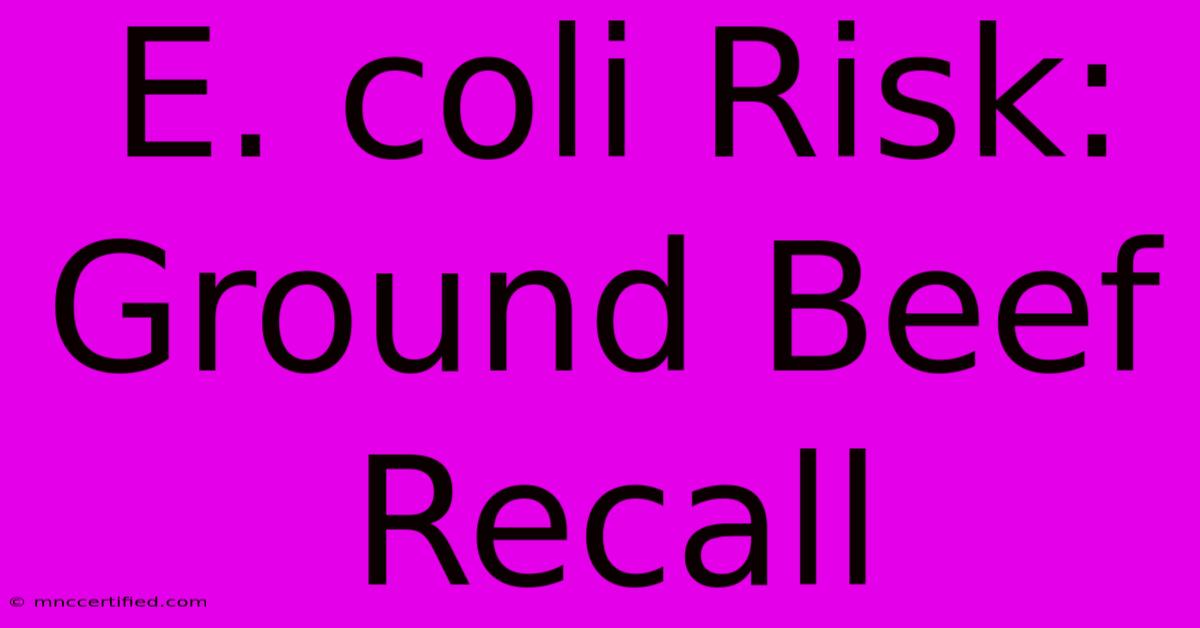E. Coli Risk: Ground Beef Recall

Table of Contents
E. coli Risk: Understanding and Avoiding Ground Beef Recalls
E. coli contamination is a serious concern when it comes to ground beef, leading to periodic recalls that impact consumer safety and the food industry. This article delves into the risks associated with E. coli in ground beef, explains why recalls happen, and offers practical advice on how to minimize your risk.
What is E. coli?
Escherichia coli (E. coli) is a type of bacteria commonly found in the intestines of humans and animals. While most strains are harmless, some, like E. coli O157:H7, are pathogenic, meaning they can cause illness. This particular strain is a major concern associated with ground beef recalls. Infection can lead to serious symptoms, including:
- Diarrhea (often bloody): This is a common and significant symptom.
- Severe stomach cramps: Abdominal pain is frequently reported.
- Vomiting: This can be a sign of severe infection.
- Fever: While not always present, fever can indicate a more serious infection.
- Hemolytic uremic syndrome (HUS): This is a potentially life-threatening complication, particularly in young children and the elderly. HUS can cause kidney failure.
Why are Ground Beef Recalls Necessary?
Ground beef is particularly susceptible to E. coli contamination due to its production process. The grinding process mixes bacteria from the surface of the meat throughout the entire product. Even if only a small portion of the original beef is contaminated, the bacteria can spread widely.
Recalls are initiated when:
- Testing reveals E. coli contamination: Routine testing by food producers and government agencies identifies the presence of harmful bacteria.
- Illness outbreaks are linked to a specific product: When multiple cases of E. coli infection are traced back to a particular batch of ground beef, a recall is necessary.
- Contamination is suspected: Even without confirmed E. coli presence, a recall might be issued if there's a reasonable suspicion of contamination, such as problems during processing.
Understanding the Recall Process: Recalls are usually announced through the USDA's Food Safety and Inspection Service (FSIS) website and other media channels. These announcements will include details about the affected products, including brand names, package dates, and establishment numbers.
Minimizing Your E. coli Risk from Ground Beef
Taking proactive steps can significantly reduce your risk of E. coli infection:
Safe Handling Practices:
- Cook thoroughly: Ground beef should be cooked to an internal temperature of 160°F (71°C) to kill E. coli and other harmful bacteria. Use a food thermometer to ensure the meat reaches this temperature.
- Wash hands: Wash your hands thoroughly with soap and water before and after handling raw ground beef.
- Sanitize surfaces: Clean and sanitize all surfaces that come into contact with raw ground beef, including cutting boards, knives, and countertops.
- Avoid cross-contamination: Keep raw ground beef separate from other foods, especially ready-to-eat items.
- Store properly: Refrigerate ground beef promptly and use it within 1-2 days. Freeze for longer storage.
Choosing Your Beef:
- Buy from reputable sources: Purchase ground beef from stores with a strong reputation for food safety.
- Check for recalls: Regularly check the FSIS website and other news sources for ground beef recall announcements.
What to Do if You Suspect E. coli Contamination
If you believe you have consumed contaminated ground beef and experience symptoms, seek medical attention immediately. Early diagnosis and treatment are crucial to prevent severe complications.
Disclaimer: This article provides general information and should not be considered medical advice. Always consult with a healthcare professional for any health concerns. Information regarding specific recalls should be obtained from official sources such as the USDA FSIS website.

Thank you for visiting our website wich cover about E. Coli Risk: Ground Beef Recall. We hope the information provided has been useful to you. Feel free to contact us if you have any questions or need further assistance. See you next time and dont miss to bookmark.
Featured Posts
-
London Embassy Lockdown Security Alert
Nov 22, 2024
-
Investing In Chicago Real Estate
Nov 22, 2024
-
Urgent Evacuation Gatwick Airport Security Breach
Nov 22, 2024
-
Steelers Browns Tnf Recap Cleveland Wins
Nov 22, 2024
-
2025 Qb Lewis Joins Deion Sanders
Nov 22, 2024